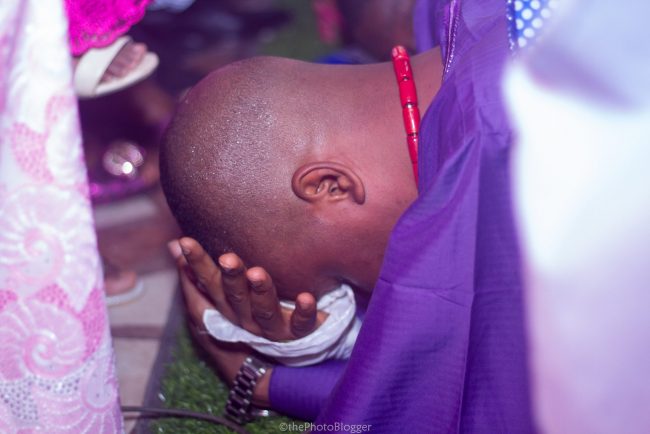Wedding introduction in Nigeria -Marriage is an institution and basically everyone will get married one day. The process of getting marriage can be very long, tiring and quite expensive in this society. In the western world though, there is not much of this, all that is usually required is getting the prospective spouse familiar with his/her future in laws during some family occasions and all.
The African society though has its exciting and very fascinating process of the ‘Marriage ceremony’. This process differs in different cultures. In this post, we will look at the Yoruba wedding introduction in Nigeria in details.
For those planning to get married or just about to, it is important that you check this post out to know exactly what you would be in for at a Yoruba wedding introduction ceremony.
Let’s get to the Yoruba Wedding Introduction in Nigeria
A man and a lady that has come together to make the final decision of settling down and live the rest of their life together are required of some necessary steps.
The lady (and even the man) is not expected to just walk up to the family and make the announcement of “I am getting married o, you people should accept my choice for me as it is mine.” and expect the complete approval from the family members.
The process starts with making of intentions known to the mother or father, as the case may be, (this, however depends on one’s close relationship with which of the parent). It is the duty of the parent who has been made aware to table the matter with the other parent. They discuss on who and where the proposed in law is and from.
In times past, the parents take it upon themselves to do a bit of ‘investigation’ into the family of the proposed in-laws. They check and recheck for any form of illness or sickness, which might be hereditary and runs in the family. If there had been a case (or cases) of bad reputation in the family, if there is any history of negativity no matter how minute.
In some instances, the Yoruba oracle is even consulted to check for any possible future mishap. All these are precautions against bad occurrences, which might easily be prevented. Nowadays though, some families do not bother with all these. Once the child announces to the parents that she or he has found the right one, they go ahead with telling their child that they have the intentions of getting to know the future in-laws in a little elaborate setting amidst singing, dancing and merriment.
In the Yoruba culture, it is the man’s family that goes to the woman’s home (hometown a-times). A date might have been fixed by the bride’s family in advance inviting the man’s family to come over so as to ‘see’ each other.
Before then, the bride’s family would have made arrangements for merriment and refreshments for their invited guests and future in-laws.
What happens on the Day of a Yoruba Wedding Introduction Ceremony in Nigeria
You may be required to bring fruits in a proper Yoruba Wedding introduction ceremony. One pointer for males though, try to take initiative in offering to pay for entertainment for the introduction ceremony. It will be left to the Bride’s family if they now decide to inform you not to bother about contributing to the ceremony. At least you have shown initiative. This goes a long way in making the bride’s family to see that you are a responsible prospective in-law.
Its good you are coming with 10 people, that is fair enough but dont be surprise if you see about 50people on that day and yes, get ready to prostrate with your friends. Your family members should have some change in their pocket because they will be asked to spray money. All the best.
On the D-day, the visitors are received not by the woman’s family though, but by some set of people who are known as the ‘Alaga ijoko’ – that is the chairperson for sitting, as they (the woman’s family) are the ones receiving the visitors, thereby they are sitting down. The man’s family is also introduced to the gathering by their ‘Alaga Iduro’ – that is the chairperson for standing, since they are the guests visiting the family to take a look at the ‘flower’ they want to pluck and nurture.( In this case, the bride is seen as a very beautiful flower who is to be plucked and taken care of). Funny right? But that’s just the way it is in the Yoruba Wedding introduction culture.
The programme may (as it is not all the time) start with few words of prayers by someone from the woman’s family. Then the programme proper starts with the ‘Alaga Ijoko’ (spokesperson for the woman’s family) asking the seated guests what their mission is, this might be in chants mannerisms as the Yorubas are noted for singing and chanting for all or almost all occasions.
The ‘Alaga Iduro’ (spokesperson for the man’s family) introduces who they are and what their mission is. All these are done in somewhat chant and sing-song which is further exemplified by a local drummer (or some drummers). He/ She/ They adds flavor to the whole singing and chanting, thereby arousing and encouraging bits of dance steps from the gathered people.
On responding to this query, the spokesperson for the woman’s family immediately responds with negativity that they have missed their way; they are in a wrong place for their mission. They are then told to go the next compound as that is where ‘flowers’ are, in abundance. Some mischievous spokesperson can even tell them that they are in the wrong town and that they have to go back to the motor park where they alighted and ask for the next town after theirs.
Now, it is important to let you know that, these ‘spokesperson’ are people whose services are being paid for. They are ‘employed’ to help out with the occasion so as to ‘do it as it is supposed to be done’. These people are the traditional wedding event planners among the Yorubas.
Back to the programme now, immediately the spokesperson for the woman’s family makes this polite but firm request of asking the man’s family to leave, the spokesperson for the man’s family burst out in song which might be a little bit melancholic so as to elicit pity from the gathered guests and the woman’s family at large. This song will be about how their son has not been able to sleep a wink ever since he laid his eyes on the lady. In this same song, they will include how they had crossed many rivers, traveled through many forests,land and deserts, being attacked by robbers losing almost everything they had set out of the house with to woo their ‘flower’. How they had been beaten by the elements, that is, rain and sunshine among many other inconveniences they had encountered just to get to the venue that day. These of course is just an exaggeration which is a tactic just to let the woman’s family have genuine pity on them and see that they are very determined to woo the lady.
The spokesperson of the woman’s family, will, after listening to their ‘stories’, pretend to converse with ‘her people’ as to whether they should consider them as eligible enough for their daughter or not. After some ‘serious’ deliberation with notable figures from the woman’s family, the spokesperson will address the man’s family again that they will have to come back some time in the future as the family is still contemplating whether to give out their daughter in marriage to them or not. On hearing this, the spokesperson for the man’s family will reply with pleading, reminding those gathered that they come from a very far place, which might (or might not) be an exaggeration. They plead for mercy that they should please be pardon as they do not want to go back empty handed so as not to be mocked by those at ‘home’.
Upon the insistence of the spokesperson from the woman’s family, they go and pretend to have ‘come back after some months’. They strongly plead that this time around, they are very much matured and will do anything to have their ‘flower’ given to them; as hope tarried weakens the heart. And that they are ready this time to do anything not to go back home ‘the way they had come’.
The spokesperson from the woman’s family ‘goes back to deliberate’ with the family members. After some few minutes, she comes back and tells the gathering that the request of the man’s family has been heard and that they should come back in ‘some months’ time’ again to check if they are being considered. This is greeted again by complete but very polite refusal from the man’s family spokesperson who believes that if they move away from the family’s vicinity again, their ‘flower’ will be snatched from them. This time, she pleads that the family is ready to do anything to have the lady.
On hearing this, the spokesperson for the woman’s family goes back to the family, holds a little ‘meeting’ with the family and comes back with positive response for the man’s family this time. She asks the man’s family to exercise a bit of patience, sit back and enjoy their stay in the house as the lady in question is not in the country at the moment. This is greeted by disapproval from the man’s family spokesperson. She sees this as a tactic from the lady’s family of refusing to give them their ‘flower’. She pleads with the family to release their daughter for them as they do not want to go back home empty handed.
The spokesperson now asks them to give the family time to check the ‘arrival time of their daughter from the abroad’. She comes back to tell them (i.e. the man’s family) that they have to pay some dues necessary in paving way for the lady’s arrival.
The man’s family is asked to pay some money to the little children in the family. This money is to stand in prayers for the little children to grow as old as the lady in question has grown well.
After this, they are asked to pay to the ‘wives’ in the lady’s family. This wives, according to the spokesperson, are the ones responsible for running errands for the lady even when it is not convenient for them to do so, but they had to oblige as they are ‘wives’. The money is, of course, paid also. After this, they are made to pay also money due to some elders in the family, as they are the progenitor of the lady’s family tree.
In some (not all) of the Yoruba tribes, the spokesperson asks the man’s family to pay also, money for the outfit the lady will be putting on when she lands in the ‘country’ as she is not supposed to be seen putting on the clothes she had on, inside the plane all through the journey.
In addition, the man’s family is asked to pay a fee which is tagged ‘Iya gbo, baba gbo” – that is, ‘The Mother and the Father agrees’. This may or may not be a specifically stipulated amount of money. After this, they are also made to pay for the ‘transport fare’ of the lady.
After all this is being paid by the man’s family, they are then asked to sit back and relax as the lady will be ‘in the country’ very soon. The ‘very soon’ is short-lived as the spokesperson of the lady’s family comes to address the man’s family that they have to pay for ‘fueling the aircraft’ bringing the ‘flower’ into the country, as the fuel in it has been exhausted and it is already airborne. She emphasizes that if the payment is not made, the aircraft is bound to meet a mishap. The man’s family, to avoid this, will quickly have to pay again for the fueling of the aircraft.
Now, the man’s family is being asked to bring in the one among them who has the intention of plucking and nurturing the ‘flower’.
The man is brought in accompanied with singing and dancing. The spokesperson for his family introduces the man to their in-laws. The spokesperson moves closer to the man and attempts to size him up. She goes back to her people and announces that she is not sure the man is ready as he is. She makes efforts of putting down the man. This may be in his dressing, with the saying that his clothes are too tight or too loose thereby portraying a not-too-good image of him. She might go on to ask the gathering if they are sure this is the man who wants to marry their daughter as he looks too thin or too fat. All this of course, is great exaggeration, adding flavor to what the order of the day is actually is. The man is then asked to perform some physical exercises, this is an attempt to display his strength and weakness, as the lady’s family has to be doubly sure that they are giving out their daughter to a man who can properly defend, protect her and at the same time fend for her.
After all this is done, the spokesperson will call out to the man to come closer and greet his future in-laws appropriately and with his friends of course. At a signal by the spokesperson for the lady’s family, the groom, with his friends and entourage, prostrates fully to the lady’s family. The prostrating exercise is being repeated over and again as the spokesperson tries to find ‘fault’ with the prospective groom and his entourage. The length of time for the prostrating exercise is determined by how well it is being carried out. If there is fault in the exercise, the spokesperson asks the man and his friends to repeat it until they are satisfied.
When this is done, the spokesperson (for the lady’s family) now introduces the man to her people. She tells them that this is the person who ants their daughter’s hand in marriage and he is making his debut appearance to them right there. She then asks the family if they accept him. With a few words of approval from the family, the spokesperson announces to the gathering that they have accepted the man as their future son-in-law. This, of course, is greeted by cheering from the gathered people. The man is then ushered to a seat which has being made ready for him and his ‘flower’, with his friends following him of course.
The spokesperson now addresses everyone to relax as the lady will soon join them, making everyone sit back and relax.
Minutes later, the spokesperson for the lady’s family holds a brief meeting with her people and announces to the other family that they lady has truly ‘landed’ and will be bring in shortly. She then ask the man’s family to put down some money which they do cheerfully has they expect the arrival of their flower’.
A lady is then ushered in, covered with heavy clothing on her head downwards so as to hide her face from public view, by the ‘wives’ in the lady’s family. They sing and cheer to announce the arrival of this ‘abroadian’. She is brought in and made to sit on a chair while the singing and dancing stops for a while. The spokesperson for the lady’s family now calls on her colleague representing the other family to come check their bride out.
The spokesperson moves closer to the lady and gently removes the clothe covering her face, she announces to everyone present that this is not the ‘flower’ which they had climbed mountains, swam oceans, dared robbers and lost almost everything for.
The spokesperson from the lady’s family now apologizes, claiming a mix up. She tells the man’s family that if they want to see their real bride then they have to pay more than they have been doing since as their daughter is not for free. This time, the man and his friends, pay for the education of the lady right from infancy to the stage she is at. They also pay for some things she had damaged in the house while growing up, among other payments.
When the spokesperson is convinced that he has really done enough, she then announces that the bride will be brought in. she then ask for the transport fare of the lady which will be used to pay for her transport from the hotel she is lodging in, to where they are all gathered.
The ‘wives’ from the lady’s family now ushers in the bride, amidst great singing, dancing and cheering. This time also, the lady is covered from head downwards so as to conceal her face from the gathering. She is made to dance to where the man is seated, still fully covered, with her escorts still in tow.
The lady is made to sit beside the man and the escorts move back to where they come from. By this time the dancing and cheering is quieted down, and the spokesperson will ask the man to pay again before the covering is being removed from the lady’s face. This time, the man and his people are convinced that the lady under the covering is their bride, so, they pay the required money willingly.
The spokesperson now asks the man to remove the cloth from the lady’s head. This he does and the gathering goes up in loud cheer as it is confirmed that their ‘flower’ as being delivered to them after all the ‘stress’
The bride and the groom are then asked to go to the man’s family firstly, then the lady’s family also for prayers.
After the prayers, the elders of both families meet to determine the bride price. After them might have reached a compromise about the bride price, they then set the date for the engagement and marriage proper.
At the end of it all, someone from the groom’s family is called upon to say the prayers signaling the end of the ceremony.
Then, the time for item 7 is next. Everyone is entertained as the family of the bride might have made adequate provisions for that.
It is vital to note that this long, tiring and almost frustrating process is actually very important and makes the whole ceremony more fun for everyone. It promotes unity and most importantly the culture among Yoruba people of the south-western tribe of Nigeria.
Yorubas are well known as life givers to any form of partying and outdoor occasion. This is seen in the illustration above. In some tribes, all the explained processes are skipped comfortably. Well, not so, where I come from. The more prolonged, the merrier.
Are you aware that we allow you to give wedding shout outs to family and friends on the blog? Check out our S/O category and start sending all the S/O you want to, NOW!
Yoruba Wedding Introduction Ceremony – Important pointers that will guide the groom
Have you read my collection of wedding introduction messages you can share to your friends?
1. Manage your budget. Whether you like it or YES, You may spend nothing less than N50,000 in a wedding introduction ceremony. This is excluding entertainment expenses though. Which is dependent on the bride’s family taking over the entertainment fee. If you are to support the bride’s family by also contributing for entertainment and refreshment, you should be aware that this is a different ball game entirely.
2. Remember that you will need to get two baskets as gifts to the family of the prospective bride. One will be for all kind of fruits. Get as much as you can in the basket, some bride’s family can be very detailed and may want to check out what you have brought as fruits. The other basket will be for all kind of wines and fruit juices.
3. You need to have enough money in your pocket, from the smallest denomination to the highest, you just need to be in possession of these notes as you will have to spend money on various people at the introduction ceremony.
4. All in All, relax, have fun and enjoy the ‘feferity’ that comes with a Yoruba introduction ceremony.
Do you have other additions to Yoruba wedding introduction in Nigeria. I am aware that this wedding introduction defer from culture to culture; within Yoruba land and even from tribe to tribe. How does wedding introduction work in your culture? Please drop your thoughts in the comment section below.





8 Comments
Yoruba Traditional Marriage: What You Should Know | DeeDee's Blog
June 29, 2019 at 2:02 pm[…] The Yoruba Introduction Ceremony […]
Olamide Anjorin
January 2, 2020 at 9:13 pmWow that’s awesome, I love it.
Yoruba Traditional Wedding List - 2020 Detailed Guide | DeeDee's Blog
February 28, 2020 at 7:45 pm[…] Yoruba Introduction Ceremony […]
Aigbedion
September 13, 2020 at 11:53 pmProtocols explained above is actually the traditional engagement protocol and not a typical Yoruba introduction ceremony process. The very first formal meeting between the prospective in-laws is not as lengthy.
Oladimeji opeyemi
October 5, 2021 at 10:58 pmWhat if I don’t any spokesperson that can speak in my family as the groom what would happen
Arewa
November 16, 2021 at 9:53 pmOne person can do both if there is no spokesperson from the groom side
My name is Arewa
You can call for my service if you need a spokesperson0810 416 4643
Tosin
April 30, 2022 at 11:04 pmThe above is too lengthy and perhaps for engagement. Introduction does not take more than 2hours these days.
Omolara salako
June 10, 2022 at 11:34 amPls I would like to know if the bride family would also give the groom family gift when they are going